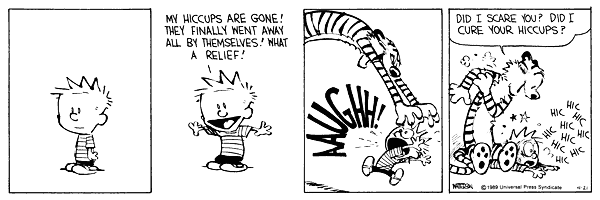Once there were two men who chanced to join a large company on the same day. They sat in the same row on the same floor of the same office, and so became friends.
Both were good and honest workers, but it happened one day that the two men discovered that one was paid a dollar more than the other.
“Oh, haha, it’s really no matter,” said the man who was payed less, and he tried to put it out of his mind.
But days passed and he could not ignore the plain fact that he was paid a dollar less.
“Ah, I’ll work harder,” he said to himself. “That way my salary will increase, and I can put it out of my mind.”
So the man who was payed less began to work harder than his friend. He took shorter lunches, and stayed late nights, and was more diligent in his work.
Once his pay was raised, he contrived to compare salaries with his friend. But his friend’s pay had been raised too, and both men were surprised that it was still a dollar more.
The man who was paid less laughed it off, but he was still quietly troubled, and sought to fix the discrepancy.
“Maybe he’s a better negotiator,” thought the man who was paid less. “I’ll ask for a little more money. Then I’ll have the most, and I can put this out of my mind.”
So the man who was paid less asked for more money, and since he was hard working, his boss said yes.
The man who was paid less sought out his friend. “I asked for more money,” he said.
“That’s strange! So did I,” said his friend. And they were surprised to find that the friend was still paid one dollar more.
The man who was payed less put on a cheerful face, but he was furious, and immediately returned to thinking about how to catch up.
“Maybe he cuts corners,” thought the man who was payed less to himself. “That’s it. He cheats a little in his work. I’ll have to do the same to catch up.”
So the man who was payed less started to cheat his employer in small ways. He pretended to work late, but often snuck out. He made up numbers on some of his work sheets. But he wasn’t good at covering his tracks. His boss found him out, and he was forced to resign.
He happened to meet a recruiter around the same time, and the recruiter put him in touch with another company, who gave him a job for even more money.
He compared again with his friend, and was shocked to find the friend had gotten another raise and still made a dollar more.
The man who was paid less carried on like this for years. He tried everything he could to increase his salary, but his friend was always paid more. He tried good things and bad things. He tried switching jobs, many times. He tried praying. He even tried to let it go, but he could not.
Finally the man who was paid less gave up and retired. A while later, his friend retired two.
One day, when they were very old, the man who was payed less asked his friend how he’d managed to always make more.
“Did you work hard without my knowing it?” he asked.
“No. I think I did the average amount.”
“Did you cheat? Were you cleverer than me? Were you that much more savvy about office politics?”
“No. If anything, I felt like you became the clever and political one because of this. And I never cheated.”
The man who was payed less thought for a moment.
“That’s it! You must have been nicer than me! More decent, more deserving. If you’d been payed less, you would have accepted it gracefully. It wouldn’t have eaten at you like this.”
“Oh, not at all,” said his friend. “If anything I would have fared worse and been more jealous. That’s why I was always so polite and modest about it. I figured it must have hurt you, as it would have hurt me. Anyway, there’s nothing I could do about it.”
“There wasn’t,” agreed the man who was payed less.
Some time later, the man who was payed less passed from this earth. It is almost not worth mentioning that he had lived a decent life, had a nice family, or experienced many interesting things, since although these things were true, they were of little account to him personally.
The man who was payed less went to his afterlife, and was directed by an angel to wait in line to meet his maker. Far from fearing judgement, the man who was payed less waited eagerly, for he hoped to obtain an explanation from Kami.
When his turn came, he stepped confidently into Kami’s office and strode right up to the chair reserved for him. He didn’t wait for an introduction or a preamble, just sat down and asked, “Why did he always get a dollar more? What was the lesson in that? What was the reason?”
“Sometimes these things just happen,” said Kami.
If this tale offends your sense of how things ought to be, perhaps you feel differently than you thought about the meaning of life (or lack thereof).








